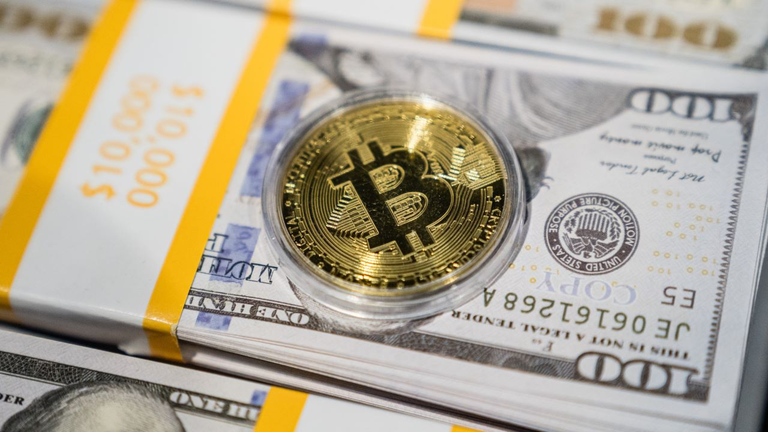Pennsylvania Lawmaker Introduces Bill for "Strategic Bitcoin Reserve"
KEY FACT: Pennsylvania State Representative Mike Cabell recently introduced a bill to establish a “strategic Bitcoin reserve” for the state. This bill would allow Pennsylvania’s treasury to invest up to 10% of its general funds in Bitcoin, including assets from the State General Fund, Rainy Day Fund, and State Investment Fund. Cabell presented the proposal as a hedge against inflation and economic uncertainty, aligning with similar trends by firms like BlackRock and Fidelity. The initiative draws inspiration from the Satoshi Action Fund’s framework.

Image Source: US Dollar, Bitcoin
Pennsylvania Lawmaker Introduces Bill for "Strategic Bitcoin Reserve"
The Pennsylvania State House of Representatives is considering integrating Bitcoin into its financial strategy, with a recently introduced bill by State Representative Mike Cabell. This proposal, named the "Strategic Bitcoin Reserve Act" would empower the state treasury to invest a portion of Pennsylvania’s general funds in Bitcoin. Cabell believes that this addition to the state’s portfolio could serve as a hedge against inflation and economic downturns, ensuring financial stability and growth amidst growing uncertainty in global markets.
The new bill introduced in the Pennsylvania House of Representatives on Thursday, November 12, as HB 2664, is the first of its kind and would allow the state's treasury to allocate up to 10% of the state’s General Fund, Rainy Day Fund, and State Investment Fund as a way to help combat inflation. As of November, the state’s Treasury reported it had more than $9.7 billion in its General Fund and roughly $7 billion in its Rainy Day Fund.
These funds are typically designated for budget stability and critical investments; thus, Cabell’s approach aims to diversify Pennsylvania's financial assets. The move comes as more institutional investors, including financial giants like BlackRock and Fidelity, turn to digital assets to secure their portfolios and broaden asset diversification.
Representative Cabell’s bill taps into the increasing public interest in Bitcoin, often called “digital gold” due to its fixed supply and decentralized nature. Many investors see Bitcoin as a safe haven during economic instability, particularly due to its independence from traditional financial systems and government control.
Pennsylvania's proposed reserve is not an isolated strategy; similar efforts are underway in other states and corporations worldwide. Cabell's proposal is in tune with a recent trend where state governments and financial institutions seek alternative assets to safeguard public and private investments from inflationary pressures. For instance, U.S. companies such as MicroStrategy have adopted Bitcoin as part of their corporate strategy, while countries like El Salvador have made Bitcoin legal tender.
The proposed reserve would also create a mechanism for regularly assessing the Bitcoin holdings, to ensure that the asset’s high volatility is carefully managed. Pennsylvania’s treasury would assess the market trends, with a focus on maintaining transparency and oversight to mitigate the risks associated with holding digital assets.
Supporters of the initiative argue that the creation of a strategic Bitcoin reserve could be a step forward in protecting taxpayer money from inflationary devaluation. Given Bitcoin’s decentralized structure and independence from central banks, the asset is seen by advocates as less vulnerable to inflationary pressures compared to fiat currencies. Furthermore, as institutional trust in Bitcoin continues to rise, this move may help Pennsylvania stay at the forefront of financial innovation.
However, Cabell’s proposal is expected to generate substantial debate within the state legislature. While there is optimism regarding the long-term benefits of Bitcoin, some critics are concerned about the currency’s volatility, which could impact the state’s finances in the short term. Additionally, regulatory concerns over Bitcoin’s legal standing and the federal government's stance on digital assets could also complicate the implementation of the reserve.
Cabell’s initiative takes its inspiration from frameworks established by the Satoshi Action Fund, an organization that has been active in advocating for Bitcoin adoption at the state level. As more states explore cryptocurrency, Pennsylvania’s decision on this bill could become a reference point for others evaluating the integration of digital assets in public funds.

If you found the article interesting or helpful, please hit the upvote button, and share for visibility to other hive friends to see. More importantly, drop a comment below. Thank you!
This post was created via INLEO, What is INLEO?
INLEO's mission is to build a sustainable creator economy that is centered around digital ownership, tokenization, and communities. It's Built on Hive, with linkages to BSC, ETH, and Polygon blockchains. The flagship application: Inleo.io allows users and creators to engage & share micro and long-form content on the Hive blockchain while earning cryptocurrency rewards.
Let's Connect
Hive: inleo.io/profile/uyobong/blog
Twitter: https://twitter.com/Uyobong3
Discord: uyobong#5966
Posted Using InLeo Alpha
This , I think would becomea world phenomenon. As the US leadership changes, the adoption rate for Bitcoin would drastically improve.
Hello uyobong!
It's nice to let you know that your article will take 10th place.
Your post is among 15 Best articles voted 7 days ago by the @hive-lu | King Lucoin Curator by keithtaylor
You receive 🎖 0.6 unique LUBEST tokens as a reward. You can support Lu world and your curator, then he and you will receive 10x more of the winning token. There is a buyout offer waiting for him on the stock exchange. All you need to do is reblog Daily Report 484 with your winnings.
Buy Lu on the Hive-Engine exchange | World of Lu created by szejq
STOPor to resume write a wordSTARTthanks for the mention and selection.